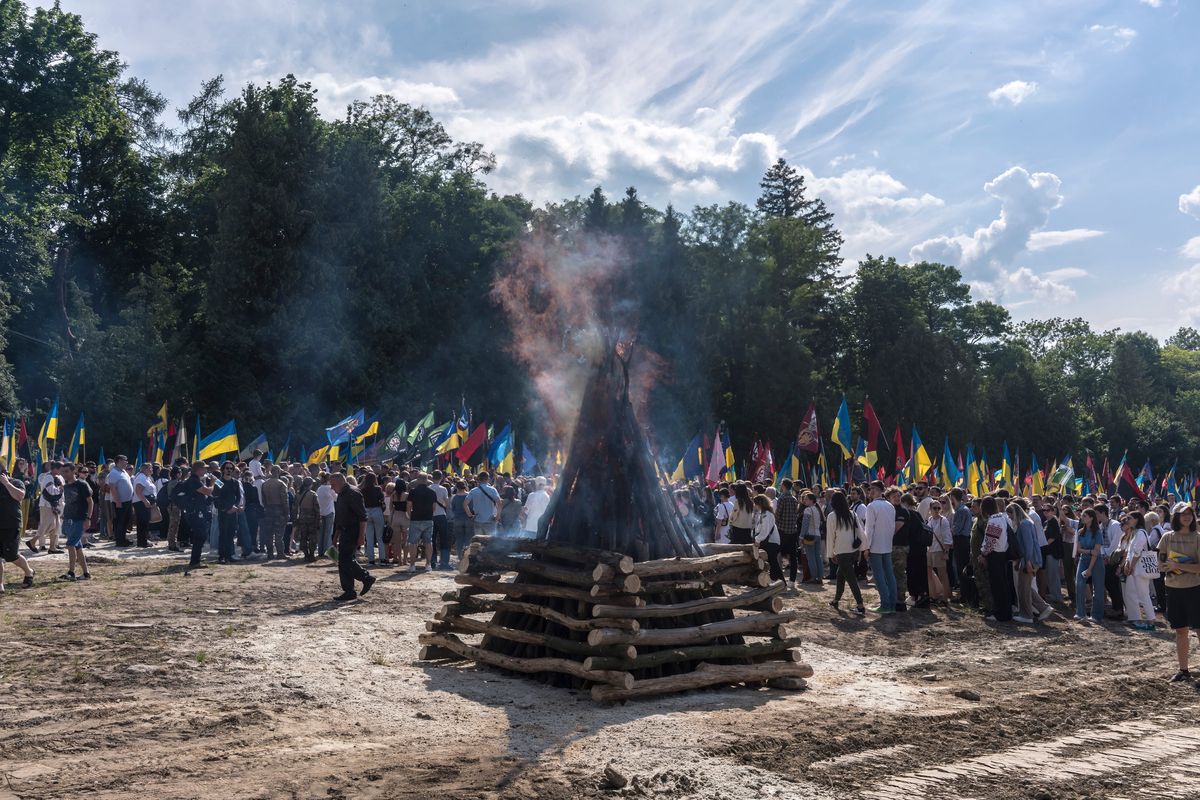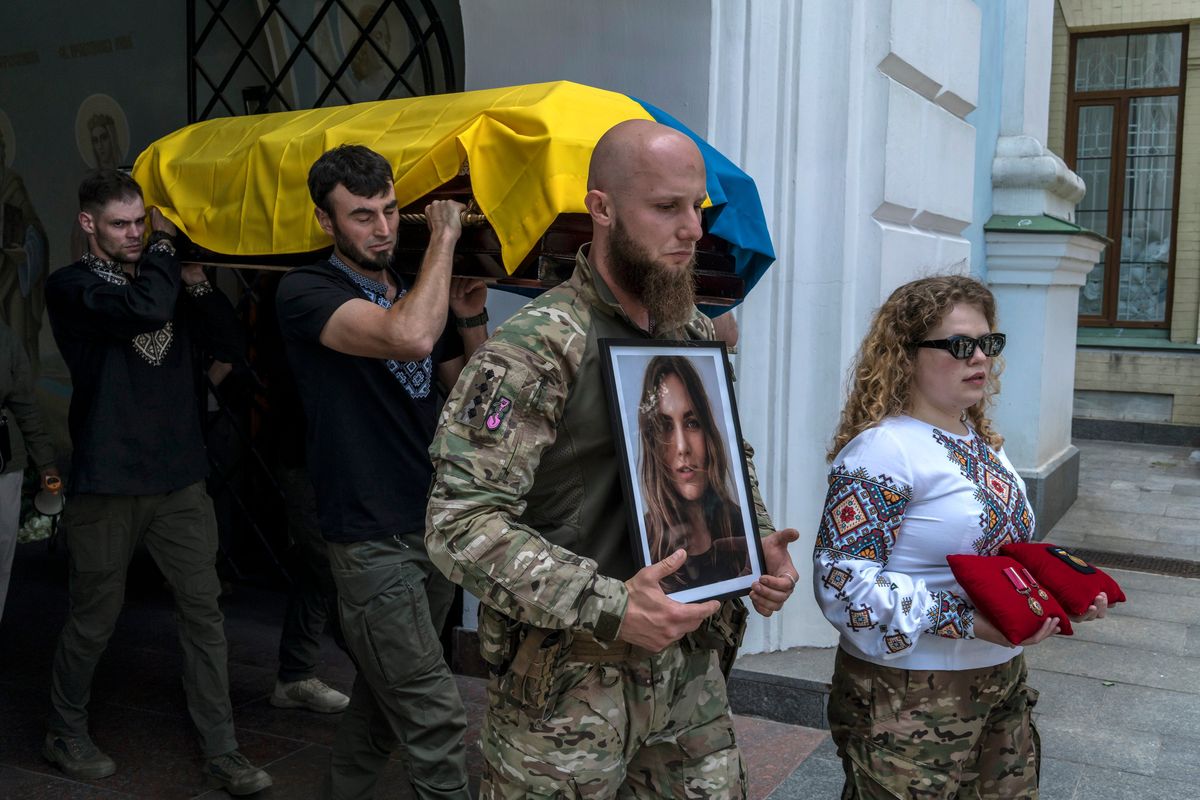A combat medic’s quest to change tributes to fallen soldiers
People gather around a bonfire nearby to sing and drink tea, around Iryna Tsybukh’s coffin, which was placed in the soil of a military cemetery on June 3 in Lviv, Ukraine. Tsybukh, who was killed on the front line in Ukraine, wanted to humanize the way Kyiv commemorated the war dead. She also left notes for her own funeral. (BRENDAN HOFFMAN)
KYIV, Ukraine – Her funeral would be “awesome,” the young Ukrainian combat medic said, if it went as she had planned.
Mourners should wear a traditional embroidered shirt known as a vyshyvanka, the medic, Iryna Tsybukh, said in a video message to a friend outlining her wishes for her funeral if she was killed on the front line. Soldiers could come in army fatigues. And everybody should learn 10 “meaningful” Ukrainian songs to sing around her coffin.
“Everyone will sing and learn something,” she said in her message, smiling. “In short, my funeral won’t be in vain.”
Her request proved to be prescient. Tsybukh was killed May 29 on the front line near the city of Kharkiv, in northeastern Ukraine, days before her 26th birthday. Her family and her battalion have chosen to withhold the details of how she died. At memorial and funeral ceremonies, thousands of Ukrainians in vyshyvankas and army uniforms sang her songs.
For Tsybukh, who also managed educational projects and was a journalist, the guidance she provided for her funeral was more than just personal preference. Yes, she wanted people to sing to relieve their sorrow over her death, but also to more fundamentally change how Ukraine remembers its fallen soldiers.
So she made it her mission. She shared her views as widely as she could – in posts and stories on Instagram, in interviews with Ukrainian news media that were published online and in her articles. In a country grappling with the enormous toll of the war with Russia, she became a leading voice on how to commemorate the country’s war dead.
Her Instagram page has around 25,000 followers, and her TikTok videos regularly received tens of thousands of views. When her brother, Yurii Tsybukh, shared the news of her death on social media, he also shared a posthumous letter to her family and friends. The post has received more 100,000 likes.
Instead of centering commemorations around the grand Soviet-style memorials to the war dead that are typical in Ukraine, Iryna Tsybukh campaigned between front-line stints for what she felt was a more human approach, one that would bind the people left behind in more meaningful ways, like a daily moment of silence.
Ukrainians needed to understand, she said, that their daily lives continued because others died protecting them.
“When we stay alive, we unwittingly become responsible to the dead, to talk and remember what happened,” Tsybukh said in an interview with Ukrainska Pravda, a Ukrainian news outlet, just weeks before she was killed. “This is the way to be at peace with ourselves.”
A major part of that should be the government’s responsibility, she said, arguing that state institutions were ineffective at helping citizens honor soldiers and understand why they had to continue a centuries-long fight for Ukrainian independence.
Official commemorations for Ukraine’s war dead have been updated in recent years – most significantly in 2021, with a change of burial procedures, and in 2022, with plans for a National Military Memorial Cemetery. But they still center on towering granite structures built across Ukraine when it was part of the Soviet Union, and adorned at the time with red Soviet flags.
Tsybukh called the memorials impersonal and built to celebrate the power of a totalitarian state rather than the feats of its individuals, particularly Ukrainian peasants who became an expendable resource of the Soviet Army in World War II.
And that stood in stark contrast with the values that have shaped Ukraine’s fight against Russia since 2014, Tsybukh wrote in a column for Ukrainska Pravda.
Official commemorations usually involve transporting soldiers in flag-covered coffins to central squares of Ukrainian cities and cemeteries as bands play music, in a ritual that has become all too familiar after more than two years of war.
But across the country, other ways of tribute have also sprung up – like the singing and the bonfire that honored Tsybukh. In some regions, crowds often kneel before funeral corteges, throwing flowers for deceased soldiers. Impromptu memorial services are held in many cities, with people speaking at microphones about those who died. Some brigades celebrate the lives lost with readings of patriotic verse.
Tsybukh wanted the government to look at the different methods of commemoration being used across Ukraine and promote and institutionalize the best of them.
She also took issue with government initiatives such as building unknown soldier monuments for those killed in the war with Russia, saying that the structures did not make sense given the realities of today’s conflict.
“We are different. We know everyone who died for Ukraine,” she said in a recent interview on YouTube. “We will surely identify all the people. That’s why no monument for an unknown soldier can exist in the Ukrainian format.”
The National Military Memorial Cemetery is partly modeled after Arlington National Cemetery in the United States, and the first burials are expected to take place there this fall. The cemetery is set to have an unknown soldier monument whose design has yet to be decided.
“It will have an opportunity to bury soldiers for 100 years to come – including those who will return from the war and die in old age,” said Maksym Zubov, 30, a scholar and a veteran who is in charge of figuring out of how the cemetery will memorialize the fallen soldiers taken there.
One of the main focuses of Tsybukh’s campaign was a moment of silence that was instituted by the government at the beginning of the war. The practice is sporadically observed across the country; in some places, cars and people come to a stop for a minute every morning, but in other places, like Kyiv, the capital, many people do not really pay attention to it.
Weeks before her death, Tsybukh, wearing her military uniform, gave a presentation in Kyiv alongside other activists to press for the expansion of the practice across the country.
A minute of silence held every day at 9 a.m., she said, would provide a meaningful way for Ukrainian civilians to commemorate the war dead and help them understand and process their shared traumatic history.
“The highest value is freedom,” she wrote in the letter that her brother posted online. “To have freedom, you need to also hold other kinds of values. You need to understand yourself, to clearly know who you are for yourself, what your personal happiness is, and how you can reach it. Once you have the answers to this question, the most important thing is to keep going.”
Thousands of people attended two days of farewell ceremonies for Tsybukh in Kyiv and Lviv.
Her coffin was placed in the soil of a military cemetery in Lviv, and people gathered around a bonfire nearby to sing and drink tea, as she had wished. Before the burial, her brother repeated his sister’s message in a clear, strong voice.
“I’ll end the way she ended her will,” he said, referring to a text message for friends posted with video instructions for her funeral: “ ‘Kisses. I lived, loved, fought.’ ”

